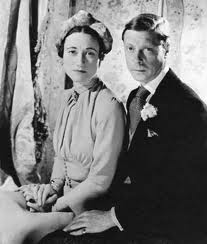The Abdication of Edward VIII and Irish Independence.
Cathal Brennan looks at the impact of the British monarchy’s abdication crisis in 1936 on Ireland.
 The decision of King Edward VIII to marry the American divorcée, Wallis Simpson, caused a constitutional crisis for the British government and for the Commonwealth.
The decision of King Edward VIII to marry the American divorcée, Wallis Simpson, caused a constitutional crisis for the British government and for the Commonwealth.
The political and social convulsions which gripped the UK over the proposed marriage presented the government of the Irish Free State with an opportunity to pursue their political agenda of continuing to dismantle the Anglo – Irish Treaty and removing the Crown from internal Irish politics.
Edward’s Difficulty is Ireland’s Opportunity
In a letter to de Valera in December of 1936 the secretary of the Department of External Affairs, Joseph P. Walshe, wrote, ‘Just as the British have used political divisions here for their political advantage we are entitled and are bound to turn their present difficulty to our own account.’[1]
The Statute of Westminster of 1931 meant that each dominion had to approve the accession of a new monarch
The Statute of Westminster of 1931 established legislative equality for the different parliaments of the Commonwealth with the UK parliament in London. The second paragraph of the preamble to the Statute stated;
The Crown is the symbol of the free association of the members of the British Commonwealth of Nations, and as they are united by a common allegiance to the Crown, it would be in accord with the established constitutional position of all the members of the Commonwealth in relation to one another that any alteration in the law touching the Succession to the Throne or the Royal Style and Titles shall hereafter require the assent as well of the Parliaments of all the Dominions as of the Parliament of the United Kingdom:[2]
Walshe summed up the difficulty the Statute presented the British government in dealing with the abdication by writing that, ‘in order to carry out its policy the British Cabinet must secure the assent of the Dominions, and possibly even their subsequent co-operation in legislative action.’[3]

On the 29th of November, the Assistant Secretary of the Dominions Office, Sir Harry Batterbee, called on Éamon de Valera on behalf of the British Prime Minister, Stanley Baldwin. In a memorandum by the Department of External Affairs, they referred to the visit as a ‘purely friendly, personal and secret way’ to pass on the sensitive information regarding the crisis in the monarchy.[4] Batterbee outlined to de Valera the recent contact between Baldwin and the King.
The Simpson dilemma
Despite what Prime Minister Baldwin had described as “grave consequences” the King had told him that since Wallis Simpson’s divorce was now final he intended to proceed with his plan to marry her, although he accepted that it would be ‘out of the question’ that she would become Queen and that their children would succeed to the throne.[5]
The King was torn between abdication of the throne, in favour of his brother the Duke of York, and going ahead with the marriage on condition that Wallis Simpson would not be treated as Queen nor appear at state occasions, and that the Act of Settlement be amended to bar children of the marriage from succeeding to the Crown. [6]
The Irish position
Through Batterbee, Prime Minsiter Baldwin, obliged to consult Ireland as a Dominion, sought de Valera’s thoughts on the following options:
(1) The King’s marriage to Mrs.Simpson, she becoming Queen.
(2) The King’s marriage to Mrs.Simpson without abdication, Mrs.Simpson not becoming Queen, and the necessary legislation.
(3) A voluntary abdication of the King in favour of the Duke of York.
The Irish saw the issue primarily in terms of weakening the ties of the British monarchy to the Irish state.
The Irish saw the issue primarily in terms of weakening the ties of the British monarchy to the Irish state. In his memorandum to de Valera, Walshe wrote that if the marriage went ahead it would weaken the monarchy as an institution in Britain, weaken the constitutional position of the British cabinet and also strengthen the position of those Dominions who were slow or reluctant to follow the lead of the British cabinet.
For those reasons Walshe recommended that the Irish government not impede the marriage but to recommend that a morganatic marital arrangement [i.e. one where the husband’s titles are not passed on to his new wife or children by her] would suffice.[7]
Walshe referred to the fact that Edward VIII might attempt to dismiss his government and ask another politician to form a new cabinet. As the meeting between Baldwin and the King on the 25th of November had shown, there was a body of support for the King retaining the throne, while marrying Mrs. Simpson, within certain sections of British political life.
Winston Churchill – ‘a man venal and unscrupulous’
Walshe wrote that the politician the King would most likely turn to in this situation would be Winston Churchill. Walsh referred to Churchill as the deadly enemy of Baldwin, and described him as, ‘venal and unscrupulous, whose house was founded by a man who betrayed his first patron, James, Duke of York, and who allowed his wife to pander to an erotic Queen. He is a figure of great potentialities and of over-weening ambition.’[8]
Walshe believed that as Churchill’s career was in the wilderness he was willing to gamble on his political future by taking the King’s side and if he was asked to become Prime Minister he, ‘would exercise a personal domination that has not been known in Great Britain since the days of Walpole’[9]
Irish ‘moral superiority’
The Irish government seemed to take every opportunity to highlight the fact that the crisis was caused by the issue of divorce and seemed to take a very superior attitude to the British on the issue. Walshe wrote, ‘a very large proportion of the British people have very lax views in regard to marriage and divorce.’
Walshe wrote;’a very large proportion of the British people have very lax views in regard to marriage and divorce’ and of, the growing laxity in religious matters of the English people’
In a telegram to Baldwin on the 3rd of December de Valera informed the Prime Minister that he favoured the second of the three options; The King marrying Simpson without here becoming Queen, on the ‘assumption that divorce was a recognised institution in England.[10]
Despite this attitude, Walshe had outlined some of the reasons why Edward VIII marrying a divorcée would create grave problems for continuing with his role as sovereign and Supreme Governor of the Church of England.
The Church of England forbade divorcées from getting married in their churches while their ex – spouses were still alive. Walshe wrote that there were serious doctrinal differences between the Anglican and Non-Conformist Churches on the issue of divorce and that the King might seek to marry Mrs. Wallace in a Non-Conformist Church. This could lead to a renewed hostility between the Protestant faiths despite, ‘the growing laxity in religious matters of the English people in general.’[11]
On the 4th of December Baldwin sent a message to all the Dominion governments stating that, ‘if the King voluntarily abdicates, the necessary steps to regularise the position and to establish the Duke of York as King should be taken promptly, accurately synchronised, and of course after consultation and agreement between the various Governments. Everything should be arranged in detail in advance. The King’s abdication would be his own act not taken on the advice of any of his Ministers.’[12]
On the 6th of December, de Valera sent the following message to Edward VIII:
‘I have been informed that Your Majesty has under consideration the question of your voluntary abdication within the next few days. I should be glad to learn directly from Your Majesty for the information of my Government what Your Majesty’s intentions are in this matter since this step could not be effected, in so far as the Irish Free State is concerned, without the authority of the Parliament of the Irish Free State. I beg to advise Your Majesty accordingly.’[13]
One of the reasons the Irish government was looking for a delay in the speed with which events were unfolding was that de Valera’s new constitution, that he intended to put before the people, was unfinished. Since assuming power in 1932 Fianna Fáil had begun to dismantle the Free State Constitution and remove, through legislation, contentious issues such as the Oath of Allegiance to the British monarch and the role of Governor General.
The Abdication – Ireland loses its King
On the 10th of December the abdication took place and the House of Commons met to discuss the necessary legislation. Batterbee rang Walshe that afternoon to ascertain what the Irish government’s intentions were. Batterbee was greatly perturbed by the lack of information coming from Dublin. The view from Britain, and supported by Walshe, was that if there were an interval between the Commonwealth legislators and the Dáil in passing legislation affecting the Act of Settlement, that during that interval the Free State could be regarded as a completely separate monarchy with a different head of state to the rest of the Commonwealth.[14]
If there were an interval between the Commonwealth legislators and the Dáil in recognising the new King, the Free State would temporarily be a completely separate monarchy – allowing it to abolish the King as head of state.
Dáil Éireann was summoned on the 11th of December to deal with the issue. De Valera introduced legislation to give effect to the abdication, as far as the Saorstát was concerned; to delete from the the Constitution all mention of the King and of the Representative of the Crown, whether under that title or under the title of Governor General; and to make provision by ordinary law for the exercise by the King of certain functions in external matters as and when so advised by the Executive Council [Irish cabinet].[15][16]
The legislation was introduced as Constitution (Amendment No. 27) Bill, 1936 and Executive Authority (External Relations) Bill, 1936.[17]
At one sweep – and largely as a result of events outside of Ireland – the removal of the British monarchy from internal southern Irish politics, the goal of Irish republicans for many decades, had been achieved.
References
[1] UCDA P67 / 115, Dublin (undated), December, 1936.
[2] http://www.statutelaw.gov.uk/content.aspx?activeTextDocId=1081723
[3] UCDA P67 / 115, Dublin (undated), December, 1936.
[4] NAI DFA Secretary’s Files S57, 7th Decmber 1936.
[5] Ibid.
[6] Ibid.
[7] UCDA P67 / 115, Dublin (undated), December, 1936.
[8] Ibid.
[9] Ibid.
[10] NAI DFA Secretary’s Files S57, 7th Decmber 1936.
[11] UCDA P67 / 115, Dublin (undated), December, 1936.
[12] NAI DFA Secretary’s Files S57, 7th Decmber 1936.
[13] Ibid.
[14] NAI 2003/17/181, Walshe to de Valera, 10 December 1936.
[15] NAI CAB 1 / 7, Cabinet Minutes, (Cab. 7 / 377).
[17] NAI CAB 1 / 7, Cabinet Minutes (Cab. 7 / 378).